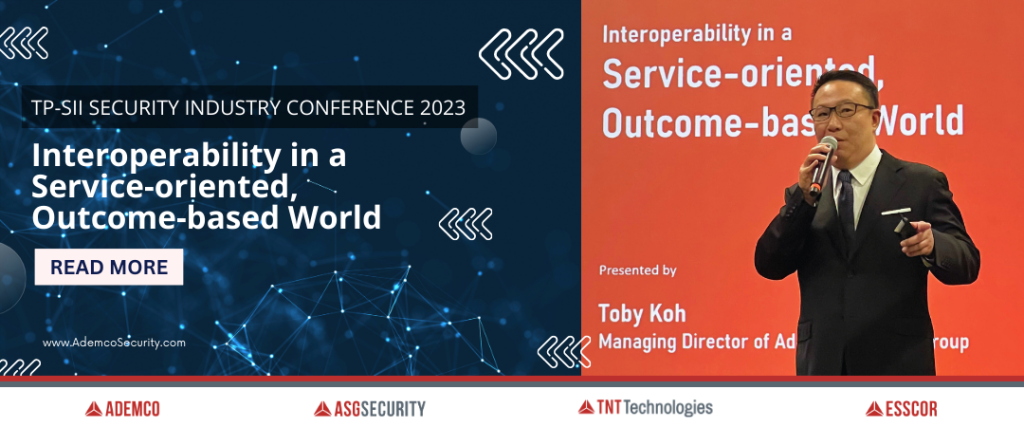In the evolving landscape of security, the Singapore government is urging a shift towards technology-driven, outcome-based security approaches. This strategy is not just to keep pace with the growing demand for security services but also to deliver enhanced security outcomes.
At the TP-SII Security Industry Conference 2023, Ademco’s Group Managing Director, Toby Koh, delivered key insights on ‘Interoperability in a Service-oriented, Outcome-based World.’ The conference, targeting management-level representatives from various sectors of the security industry, serves as a platform for sharing expertise and keeping abreast of the latest developments in security.
This year, the focus was on the importance of seamlessly integrating diverse security systems, devices, and services. Toby emphasized the potential of interoperable technology in enhancing security infrastructure, optimizing resource allocation, and improving operational efficiency.
Addressing the Risk of Over-Tooling Without Adequate Skills
As the industry faces a manpower crunch, leading organizations to seek ways to reduce reliance on human resources. One common approach is turning to technology as a solution. However, the cost and complexity of integrating these technologies can be daunting. The hasty addition of tools without the necessary skill set poses a risk of increased long-term costs and decreased productivity due to poorly integrated technology.
Balancing Technology and Manpower Through Managed Services
To effectively bridge the gap between technology and manpower, managed services emerge as a practical solution. Outsourcing the implementation and operational risks to professional service providers equips organizations with the needed expertise to manage and maintain these systems efficiently. Aligning with the goals of the Security Industry Transformation Map (ITM), organizations can benefit from tech-enabled solutions, reduce manpower dependency, and address skill gaps, all while enjoying the outcomes they seek.
Furthermore, there’s a growing need to empower existing manpower, shifting focus towards developing human advantages where they matter most. Optimizing human potential in areas requiring a human touch, decision-making, and problem-solving capabilities remains irreplaceable.
Practical Implementation: Security and Facility Management in Condominiums & Gated Communities
An effective demonstration of interoperability is evident in the integration of security and Integrated Facility Management (IFM) platforms for condominiums. Cloud-based and app-based security platforms not only save space but also minimize maintenance needs. Self-service Visitor Management Systems, part of these integrated solutions, offer convenience and reduce the load on security staff, allowing for a focus on tasks like traffic management and maintaining order during peak times. Additionally, IFM facilitates the seamless coordination of services like cleaning, maintenance, and emergency responses, enhancing the living experience.
Security innovations such as virtual guard tours and video analytics complement IFM by enhancing safety and surveillance. Video analytics detect anomalies, and virtual guard tours reduce the need for repetitive patrolling, ensuring high-quality security operations. Together, these integrated solutions improve accountability through audit trails, boost operational efficiency, and provide a comprehensive approach to managing condominiums and gated communities.
Ademco’s Role in Interoperable Security Solutions
VerifSuite offers a range of technology-enabled, outcome-based security services designed to resolve manpower issues and reduce long-term costs, enhancing security in a Security-as-a-Service approach. Its pay-as-you-use model is particularly cost-effective, significantly reducing upfront payments. This model covers installation, maintenance, and warranty fees for clients, ensuring overall cost efficiency.
Striving for a Balanced, Tech-Enhanced Security Future
In today’s dynamic security environment, transitioning to a service-based model is crucial for organizations. This approach, which harmonizes the use of advanced technology with skilled expertise, is fundamental in developing robust and efficient security systems. By leveraging managed services, organizations can effectively rely on external expertise to achieve their desired security outcomes. This not only meets immediate security needs but also positions organizations to adeptly navigate the evolving challenges of the security landscape, without the burden of hiring and maintaining their specialized workforce.

